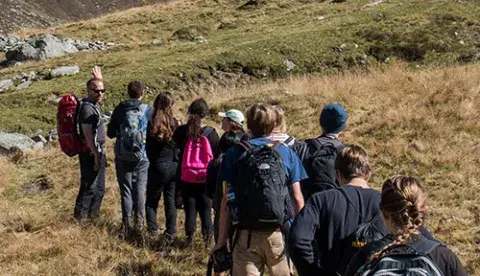
Climate change is now affecting every country on every continent. As claimed by UN’s Sustainable Development Goal 13, “Countries need to take urgent action to combat climate change and its impacts."
This is what motivated the Environmental Studies Capstone 2019, supervised by Brack Hale, Professor of Biology and Environmental Science, to actively take action to fight climate change and be an example to others to raise awareness.
Alumnae Cristina Biddlecome and Azalea Watfa, Class of 2019, together with Franklin Seniors Gabriella Muñoz, Mary Newton, Caitlin Payne, Ava Selvig, Pauline Thompson, Maria Camila Urrea and William Wallace were tasked with the development of a climate action plan for Franklin that would allow the university to contribute to the Swiss and U.S. commitments to the Paris Agreement and ideally lead to a climate neutral campus in the future.
The group gathered data regarding the institution’s greenhouse gas emissions and impact and analyzed them using the Sustainability Indicator Management and Analysis Platform (SIMAP). The students then developed three climate action goals as a pathway for gradually achieving carbon neutrality at FUS, in an effort to educate its community on how to be efficient with energy production on campus.
Read through their full climate action plan and find out about the specific mitigation strategies they developed. As remarked by Professor Hale, “the integration of sustainability-related topics across FUS’s disciplines is an important, if not essential, step toward achieving the climate action goals and at Franklin, we work hard to help our students grow into more intellectually-curious, respectful and conscientious global citizens.”
Indeed, higher education institutions have a critical role in shaping societies by educating future leaders to think critically and solve problems, especially in a changing climate context and with many sustainability challenges.As remarked by our Dean of Executive Education and Global Outreach, Carlo Giardinetti, who has recently participated as a speaker at the annual Engaged Management Scholarship (EMS) Conference, hosted by Antwerp Management School (AMS) in Belgium, “academic institutions have for long taken an important role in educating by creating and curating knowledge and develop competences. Yet, today we are in need of acquiring and nurturing some very important (and different from last century) behaviors and mindsets. Learning behaviors and nurturing mindsets is quite different from learning knowledge and competences. Universities have an important challenge ahead to create programs that foster learning with the right balance and focus on knowledge, skills, behaviors and mindset. Only by doing that they will continue to meet the expectations of our society and our planet towards the education system and its institutions.”
Also see Franklin and AIL Bring Solar to Dorm and Green Awareness to the Community.

